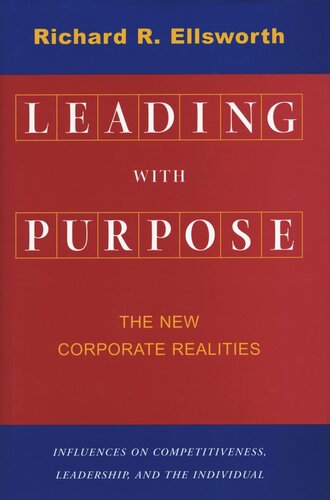

Most ebook files are in PDF format, so you can easily read them using various software such as Foxit Reader or directly on the Google Chrome browser.
Some ebook files are released by publishers in other formats such as .awz, .mobi, .epub, .fb2, etc. You may need to install specific software to read these formats on mobile/PC, such as Calibre.
Please read the tutorial at this link: https://ebookbell.com/faq
We offer FREE conversion to the popular formats you request; however, this may take some time. Therefore, right after payment, please email us, and we will try to provide the service as quickly as possible.
For some exceptional file formats or broken links (if any), please refrain from opening any disputes. Instead, email us first, and we will try to assist within a maximum of 6 hours.
EbookBell Team

4.4
52 reviewsThis book explores corporate purpose—a company's expressed overriding reason for existing—and its effect upon strategy, executive leadership, employees, and, ultimately, on competitive performance. Sharply challenging the conventional wisdom that corporations should be dedicated to shareholder wealth creation, the author presents a compelling argument that the path to competitive advantage and outstanding long-term financial performance lies instead in a customer-focused corporate purpose. The book is in four parts. Part I shows how corporate purpose exerts a powerful effect on strategy, management, and the meaning employees derive from their work. A customer-focused purpose harmonizes these critical factors and enables leaders to push strategic thinking deeper into the organization and at the same time to grant employees a greater degree of autonomy. In contrast, a goal of maximizing shareholder wealth sows the seeds of conflict among the market-oriented purpose, product-focused strategies, and the individual values of employees. Part II critiques the logic of "value-based management" and the relationship of the firm to the equity markets. It explores the validity of extending traditional concepts of property rights to share ownership, concluding that the separation of stock ownership from the responsibility for, and managerial control over, corporate actions makes traditional property rights arguments inapplicable to the underlying assets of a corporation. Part III examines the functioning of corporate purpose in a global economy. When a firm operates globally, purpose needs to retain its motivational power across national boundaries, which a shareholder-focused purpose does not do.